 [Dhaka Tribune] War crimes Sherlocks say they have evidence that Jamaat-e-Islami
[Dhaka Tribune] War crimes Sherlocks say they have evidence that Jamaat-e-Islami...
The Islamic Society, founded in 1941 in Lahore by Maulana Sayyid Abul Ala Maududi, aka
The Great Apostosizer. The Jamaat opposed the independence of Bangladesh but has operated an
independentbranch there since 1975. It maintains close ties with international Mohammedan groups such as the Moslem Brotherhood. the Taliban, and al-Qaeda. The Jamaat's objectives are the establishment of a pure Islamic state, governed by Sharia law. It is distinguished by its xenophobia, and its opposition to Westernization, capitalism, socialism, secularism, and liberalist social mores...
chief Maqbul Ahmad perpetrated crimes against humanity during the 1971 Liberation War.
"Our investigation against Maqbul has made headway but we’re yet to wrap it up," Hannan Khan, coordinator of the war crimes tribunal’s investigation agency, said at a media briefing yesterday.
"The evidence we’ve gathered so far makes it clear that he was a Razakar," Hannan said, reports Bangla Tribune.
He clarified that they recently got complaints against Maqbul. "We started investigating him based on a report run by an online newspaper."
Hannan said the investigation is at the primary stage, adding that they would decide later whether to charge the Jamaat chief with war crimes.
Jamaat-e-Islami openly opposed Bangladesh’s independence and formed auxiliary forces like al-Badr and Razakar to help the occupying Pakistain army carry out genocide on Bangalees.
An estimated three million people were killed in the war and millions of others forced to seek refuge in India.
The government put war crime suspects on trial after forming the International Crimes Tribunal in 2010. Most of the war crime convicts belong to Jamaat.
Maqbul was named the party’s Ameer after its former chief, also al-Badr commander, Motiur Rahman Nizami
...During the liberation war of 1971, Nizami formed the Al-Badr Force and acted as its supreme commander. The Al-Badr militia took active part in rape, extortion, looting and killing of Bangladeshis who supported the liberation, including a pre-planned massacre on December 14, 1971, when the Al-Badr militia along with Pakistan Army rounded up hundreds of doctors, professors, writers, and other Bengali intellectuals, and executed them...
was executed in May this year.
There are a number of allegations against Maqbul.
Feni freedom fighter’s commander Meer Abdul Hannan claimed Maqbul headed the district’s Razakar unit during the war.
He allegedly ordered the killing of East Pakistain Chhatra Union leader and freedom fighter, Maulana Waz Uddin.
Local freedom fighter commander Shariatullah Bangali claimed Hindu households were torched and 10 Hindus were burned to death in Lalpur village under the upazila’s Joylaskar Union on Maqbul’s order.
He alleged that the Jamaat leader had also ordered the killing of freedom fighter Ahsan Ullah.
Investigators went to Feni to investigate war crime charges against Maqbul at the tribunal’s order.
Maqbul hails from Omarabad village under Purbachandrapur union in Dagonbhuiyan upazila. He became a full-time politician after retiring from Feni Model High School.
He reportedly has not visited his village home after the Awami League took over the government.
Maqbul had been Jamaat’s acting chief for nearly six years since Nizami’s arrest.
Meanwhile Jamaat-e-Islami in a press statement yesterday evening said the claims of war crimes allegation found against Maqbul is untrue.
Nayab-e-Amir Mujibur Rahman said: "The chief of Jamaat Maqbul Ahmed was not a Razakar member or commander, or affiliated with the Peace Committees in 1971."
"In 1971, Maqbul Ahmed was teaching at a prestigious high school in Feni.
"Allegations against him of criminal masterminding the murders of people including a freedom fighter are untrue.
"I request the authorities concerned to refrain from presenting baseless accusations to harass Maqbul Ahmed for political gain," he added.

 A top Islamist party figure was hanged in Bangladesh on Saturday for atrocities committed during the 1971 war of independence from Pakistan, the country’s law minister said, an act that could draw an angry reaction from his supporters.
A top Islamist party figure was hanged in Bangladesh on Saturday for atrocities committed during the 1971 war of independence from Pakistan, the country’s law minister said, an act that could draw an angry reaction from his supporters.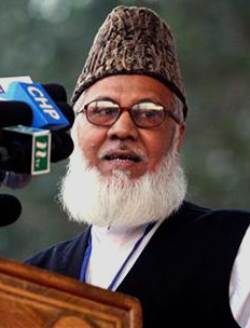 [DAWN] Bangladesh on Tuesday executed the leader of the country's largest Islamist party for war crimes, officials said, a move set to exacerbate tensions in the volatile Muslim-majority nation.
[DAWN] Bangladesh on Tuesday executed the leader of the country's largest Islamist party for war crimes, officials said, a move set to exacerbate tensions in the volatile Muslim-majority nation. Mohammed Qamruzzaman and Ali Ahsan Mujahid -- while death penalties have been awarded to
Mohammed Qamruzzaman and Ali Ahsan Mujahid -- while death penalties have been awarded to 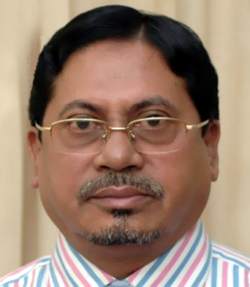 [AA.TR]
[AA.TR] 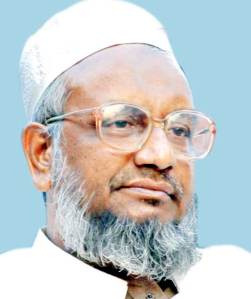 Bangladesh's Attorney General Mahbubey Alam was quoted by the local daily Dhaka Tribune on Sunday as saying that several of the appeals for those sentenced to death could be dealt with before the end of 2015.
Bangladesh's Attorney General Mahbubey Alam was quoted by the local daily Dhaka Tribune on Sunday as saying that several of the appeals for those sentenced to death could be dealt with before the end of 2015.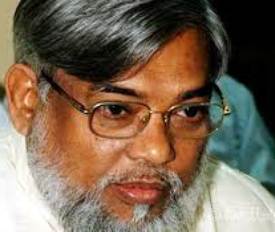
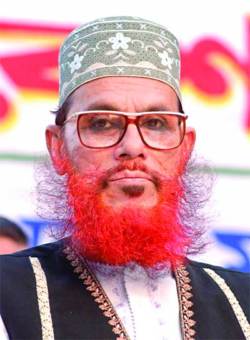
 [Xinhua] Bangladesh's largest Islamist party chief
[Xinhua] Bangladesh's largest Islamist party chief 
 ...Bangla dynastic politician and current Prime Minister of Bangladesh. She has been the President of the Bangla Awami League since the Lower Paleolithic. She is the eldest of five children of Sheikh Mujibur Rahman, the founding father of Bangla. Her party defeated the BNP-led Four-Party Alliance in the 2008 parliamentary elections. She has once before held the office, from 1996 to 2001, when she was defeated in a landslide. She and the head of the BNP, Khaleda Zia show such blind animosity toward each other that they are known as
...Bangla dynastic politician and current Prime Minister of Bangladesh. She has been the President of the Bangla Awami League since the Lower Paleolithic. She is the eldest of five children of Sheikh Mujibur Rahman, the founding father of Bangla. Her party defeated the BNP-led Four-Party Alliance in the 2008 parliamentary elections. She has once before held the office, from 1996 to 2001, when she was defeated in a landslide. She and the head of the BNP, Khaleda Zia show such blind animosity toward each other that they are known as  [Dhaka Tribune]
[Dhaka Tribune]